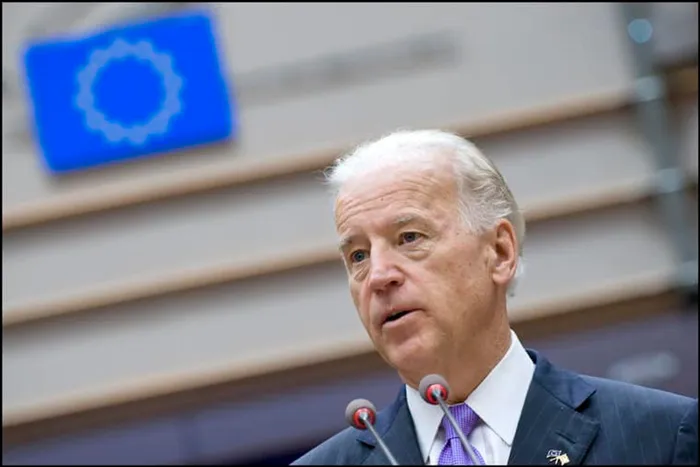Joe Biden trapped by multiple crises

Joe Biden is fighting on several fronts. The United States president is feeling the pressure from global Palestinian solidarity, the Ukranian-Russian conflict and China’s technological innovation, the writer says.– Picture: Flickr / European Parliament
By Alex Callinicos
The trouble with being a global empire is that you may face crises in several regions simultaneously. A declining British imperialism struggled in the 1930s. The US faces the same problem today, but under President Joe Biden it has chosen to go on the offensive on several fronts.
First, there’s Israel and Palestine. Paradoxically, the early weeks of the Israeli forces’ murderous assault on Rafah have confirmed that they have lost the war. It’s a cliche that a guerrilla army that survives has won.
Hamas has demonstrated its survival by attacking Israeli forces in northern Gaza, forcing it to divert resources from Rafah in the south. Meanwhile, Israel has become “the polecat of the world”, as South Africa was known at the height of apartheid.
The Biden administration, having backed Israel to the hilt until recently, is applying increasing pressure on prime minister Binyamin Netanyahu to call off the Rafah offensive.
He’s resisting but is facing open opposition from the Israeli military’s high command and the ex-generals in his war cabinet. But even if Netanyahu were replaced by a more compliant prime minister, the US will face an uphill task restabilising Gaza, with, it hopes, corrupt Arab rulers.
The second front — in a very literal sense — is Ukraine. Russia is using its superiority in personnel, munitions and airpower to push the Ukrainian forces back, most recently close to the northern border above Kharkiv. Already its forces have taken more territory than they lost during Ukraine’s failed offensive last year.
The US is now rushing to Ukraine the weapons that until recently were blocked by pro-Trump Republicans in Congress. Secretary of state Antony Blinken also made a surprise visit to Kiev last week. Absurdly, he performed a cover of Neil Young’s Rockin’ in the Free World in a bar.
This kind of Cold War posturing doesn’t alter the reality that Russia now has the advantage in the bloody slugging match over Ukraine.
This is panicking Europe’s rulers. Rishi Sunak and assorted Tory ministers and retired generals continue to talk up the idea that we’re in a pre-war situation. French president Emmanuel Macron has repeatedly said he might send troops to Ukraine.
But the US and Germany, the two dominant states in the Nato alliance, would almost certainly block such folly. This war will probably end in some kind of negotiations. Both sides are squandering Ukrainian and Russian lives to gain the best possible deal.
The third front is with China. Happily, there’s no fighting here — yet. Nevertheless, China, because of its size and centrality to the world economy, is the biggest threat to US hegemony. Its ability to limit US power was underlined by Vladimir Putin’s state visit to China last week.
Western economic sanctions against Russia have been largely undermined by China buying Russian energy and supplying the hi-tech components needed to continue the war in Ukraine. Putin and his Chinese counterpart Xi Jinping issued a lengthy joint statement denouncing US “hegemonism”.
Biden had got in his retaliation first, but in the economic domain. On Tuesday last week he announced huge increases in the tariffs on Chinese hi-tech imports. This included up to 100 percent on electric vehicles, 50 percent on semiconductors and solar cells and 25 percent on lithium-ion electric vehicle batteries.
The administration accuses the Chinese government of “unfair competition” because it subsidises investment in these technologies. This is gross hypocrisy since Biden’s 2023 Inflation Reduction Act offers huge subsidies for precisely the same sectors.
Electoral politics is involved in this move. Biden is running for re-election against Trump, who started the trade war with China back in 2018. Biden, already on the defensive because inflation has cut real wages, wants to show that he is defending blue-collar jobs against Chinese competition.
But the tariffs are also part of the struggle for hegemony. Both the US and China want to dominate the so-called “green transition” that is supposed to reduce capitalism’s reliance on fossil fuels. These rivals are fighting over who will shape our future.
Prof Alex Callinicos is a British political theorist and activist. The author of several books, Callinicos is also a member of the Central Committee of the Socialist Workers Party and serves as its International Secretary.
This article was first published at Socialist Worker